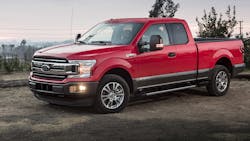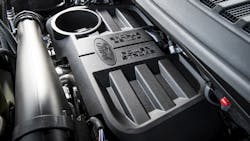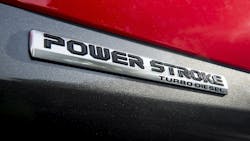The Ford F-150's new 3.0L turbo diesel makes the truck the most fuel efficient full-size pickup you can buy in the United States today, the manufacturer says — or actually, make that any half-ton to date. Ford hinted this would be the case back in January when this latest engine option, the first diesel available in an F-150, was announced for the popular pickup.
The F-150 with Ford's 3.0L Power Stroke diesel, which is slated to begin shipping to dealers this month, has official EPA-estimated ratings of 30 mpg highway, 22 mpg city and a combined 25 mpg, setting a new benchmark in full-size pickups under 8,500 lbs. The engine also delivers 250 hp. and 440 lbs.-ft. of torque, allowing towing capacity of 11,400 lbs. and up to 2,020 lbs. of payload for fleet applications or 1,940 lbs. for consumer variants.
As pickup and SUV sales have been trending noticeably up, fuel efficiency has now become an increasingly important factor. That's even more the case at Ford, which announced last week it will stop building most of its sedans within a few years. "By 2020, almost 90% of the Ford portfolio in North America will be trucks, utilities and commercial vehicles," the company noted in its first-quarter financial report.
"Given declining demand and product profitability, the company will not invest in next generations of traditional Ford sedans in North America," it added, and the only Ford vehicles of that type to continue here will be the Mustang and a new Focus Active crossover vehicle — neither of which really spring to mind when one thinks "sedan." But the company, with its strong pickup sales, has shown that it will continue investing big dollars to advance those products.
Overall, increasingly prolific pickups will need to find ways to up the ante in fuel economy, since more sales of light vehicles with highway mpg in only the high teens and low 20s makes for quite a gas-gorging OEM fleet.
According to the U.S. Dept. of Energy, looking at the current full-size pickup field:
—The closest competitor that could nip at the F-150's heels is also from the Big Three. It's the 2018 Ram 1500 with its 3.0L EcoDiesel and 8-speed automatic in 4x2 configuration, which boasts EPA ratings of 27 mpg highway/ 20 mpg city and 23 mpg combined. (Incidentally, Ram's Dave Sowers has suggested that Ram Trucks will have an answer to the Ford F-150 diesel's lead in fuel economy next year with the new 2019 Ram 1500.)
—In the General Motors stable, you can get a rear-drive 2018 Chevrolet Silverado 1500 or GMC Sierra 1500 with their available 4.3L gasoline engine, both of which have EPA estimates of 24 mpg highway/ 18 mpg city and combined 20 mpg.
—Also in the full-size category is the 2018 Nissan Titan 2WD with its 5.6L gasoline V8, which has EPA ratings of 21 mpg highway/ 15 mpg city and 18 mpg combined.
—Finally, the 2018 Toyota Tundra 2WD, with its 4.6L V8 gasoline engine, has EPA ratings of 19 mpg highway/ 15 mpg city and 16 mpg combined.
Besides the diesel engine, Ford credits the F-150 Power Stroke's fuel economy to its 10-speed automatic transmission as well as lighter weight thanks to its aluminum-alloy body and aluminum/ compacted graphite iron engine, which reduces weight but retains durability. The truck's mpg ratings are actually the highest ever for a full-size pickup; a decade ago, comparatively, you could get a rear-drive F-150 with a 4.2L gas V6 good for 19 mpg highway/ 14 mpg city and 16 mpg combined.
An available 5-speed manual then would've clicked up the 2008 F-150 and that same engine to 20 mpg highway/ 14 mpg city, but still 16 mpg combined ratings. Those kinds of figures have been about par for the course for full-size pickups for some time, although pickup fuel efficiency trends get interesting if you go back far enough.
Almost 30 years ago in 1989, for example, you could buy a rear-drive Chevrolet C1500 with gasoline 4.3L and 5-speed manual with ratings of 22 mpg highway/ 15 mpg city and 18 mpg combined; a year later, the 1990 C1500 with that same powertrain configuration was good for slightly better fuel efficiency with a rating of 16 mpg around town. That beats some offerings on dealer lots today.
"Even a few years ago, customers wouldn't have imagined an EPA-estimated rating of 30 mpg highway would be possible in a full-size pickup," said Hau Thai-Tang, Ford executive vice president of product development and purchasing. He attributed the F-150 diesel's fuel economy to the company's "crazy smart" engineers.
About the Author
Aaron Marsh
Aaron Marsh is a former senior editor of FleetOwner, who wrote for the publication from 2015 to 2019.


